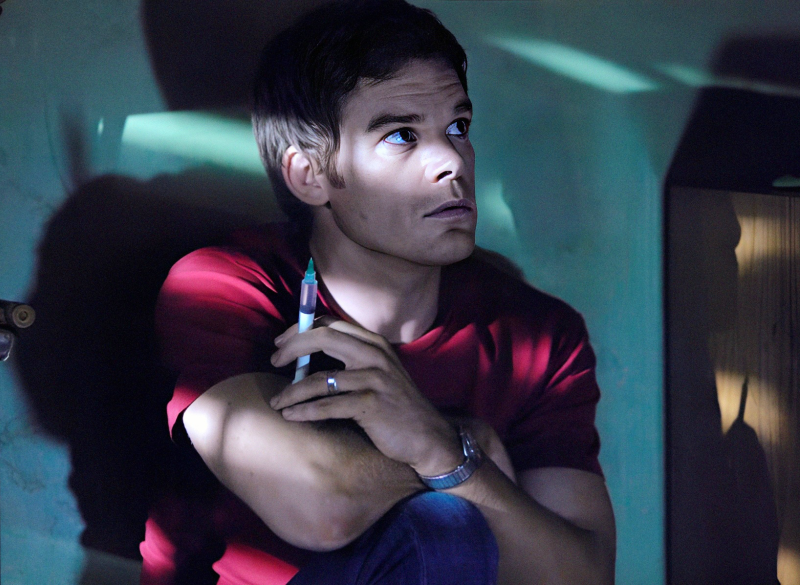Dexter's Resurrection: The Return Of A Popular Villain

Table of Contents
Analyzing Dexter's New Dark Passenger
Exploring the Motivations Behind Dexter's Return
Dexter's return isn't simply a case of a villain's return for more bloodshed; it's far more nuanced. His motivations are complex, driven by a potent cocktail of factors. What pushes this seemingly reformed killer back into the shadows?
- Unresolved Issues: The original series finale left many questions unanswered, fueling speculation about Dexter's fate and the lingering effects of his past actions. The revival might aim to address these unresolved issues, providing closure for both Dexter and the audience.
- New Challenges: The revival could introduce new threats and challenges that force Dexter to confront his dark passenger once again, testing the limits of his self-control. Perhaps new killers emerge, requiring his unique skillset.
- Redemption Arc?: Could Dexter be seeking redemption? The revival might explore his attempts to reconcile with his past and find a semblance of peace, although this seems unlikely given the nature of his "job."
The revival plays with Dexter's moral ambiguity, constantly questioning whether his actions are justifiable, even if only in his own twisted worldview. The central conflict remains: can Dexter truly escape his Dark Passenger, or is it an intrinsic part of who he is, a villain's return to his true nature?
Examining the Evolution of Dexter's Character
Has Dexter Morgan changed? This is a crucial question driving much of the discussion surrounding Dexter's resurrection. The revival provides an opportunity to examine the evolution of his character and the complexities of his moral compass.
- Shifting Methods: The revival might showcase a subtle or significant shift in Dexter's killing methods or targets, reflecting his potential evolution or simply adapting to new circumstances.
- Emotional Depth: Does he show more emotional vulnerability? The original series hinted at underlying emotional turmoil; the revival could explore this in greater depth, adding layers of complexity to his character.
- Still a Killer?: Ultimately, the core question remains: is he still a killer? The revival could explore this question, with the possibility of him choosing a different path or falling back into old habits, highlighting his enduring moral complexity as an anti-hero. His character development is central to understanding Dexter's resurrection.
The Impact of Dexter's Return on the Franchise
The Revival's Reception Among Fans and Critics
The return of Dexter Morgan generated significant buzz across various platforms. The reception among fans and critics has been mixed, with passionate debates sparking online.
- Fan Theories: The revival fueled a wave of fan theories, some predicting his demise, others envisioning a triumphant return to form. These online discussions and interpretations have greatly contributed to the cultural impact of Dexter's resurrection.
- Social Media Buzz: Platforms like Twitter and Reddit became hubs for dissecting each episode, analyzing plot points, and engaging in passionate discussions about Dexter's actions and motivations. The media coverage was intense, reflecting the substantial interest.
- Ratings and Viewership: The revival's success can be partly judged through ratings and viewership numbers, indicating the level of public interest and the franchise's enduring appeal.
The media coverage surrounding Dexter's return speaks volumes about the enduring power of this popular villain and the franchise’s impact.
The Show's Legacy and Cultural Impact
Dexter's original run left an undeniable mark on television, influencing the portrayal of psychopathy and blurring the lines between hero and villain.
- Influence on Television: The show’s innovative storytelling, complex characters, and exploration of dark themes have had a lasting impact on the landscape of television drama. The revival builds upon this legacy.
- Portrayal of Psychopathy: The show's nuanced portrayal of Dexter's psychopathy fostered conversations about mental health, ethical dilemmas, and the complexities of human nature.
- Cultural Significance: Dexter transcended the typical thriller genre, becoming a pop culture phenomenon with its unique blend of dark humor and intense drama. Its cultural impact is still felt today.
Comparing the Original Series and the Revival
A Side-by-Side Comparison of the Writing, Directing, and Overall Tone
Comparing the original series and the revival offers a fascinating insight into the evolution of storytelling and the impact of time on the franchise.
- Writing Style: A comparison of the writing styles reveals potential shifts in tone, character development, and narrative structure. The revival might adopt a more modern approach or stick to the original’s formula.
- Directing Choices: Analyzing directing choices reveals different visual styles, pacing, and use of suspense to enhance the storytelling experience. The comparison could show evolution or a deliberate return to the style of the original.
- Tone Shift: The overall tone might be different, reflecting changes in societal attitudes or a conscious decision by the creators to update the narrative's atmosphere.
Analyzing the Strengths and Weaknesses of the Revival
The revival, like any continuation, faces the challenge of living up to its predecessor's legacy.
- Successful Elements: Identifying the revival's successful elements allows for an appreciation of what worked well. This could range from compelling new characters to the successful reintroduction of existing ones.
- Areas for Improvement: Highlighting areas where the revival fell short allows for a balanced perspective. This might include inconsistencies in plot, character development, or pacing.
- Overall Assessment: Concluding with an overall assessment of the revival's strengths and weaknesses provides a complete picture of its quality, allowing a comparison to the original's impact.
The Enduring Appeal of Dexter's Resurrection
Dexter's resurrection wasn't just a reboot; it was a re-examination of a complex and compelling character. We've explored Dexter's motivations, the significant impact of his return on the franchise, and a comprehensive comparison of the original series with the revival. The enduring popularity of this popular villain is a testament to the show's enduring legacy and its ability to tap into our fascination with the dark side of human nature. What are your thoughts on Dexter's resurrection? Discuss Dexter's return in the comments below! Share your opinions on Dexter Morgan's comeback! Let us know what you think of this popular villain's return!

Featured Posts
-
 Employee Quits Pub Landlord Unleashes Profanity Filled Tirade
May 22, 2025
Employee Quits Pub Landlord Unleashes Profanity Filled Tirade
May 22, 2025 -
 Wordle Answer And Hints Today April 26 2025 Puzzle 1407
May 22, 2025
Wordle Answer And Hints Today April 26 2025 Puzzle 1407
May 22, 2025 -
 Dexter Resurrection De Impact Van De Terugkeer Van John Lithgow En Jimmy Smits
May 22, 2025
Dexter Resurrection De Impact Van De Terugkeer Van John Lithgow En Jimmy Smits
May 22, 2025 -
 Superalimentos Para La Salud Por Que Este Supera Al Arandano En La Prevencion De Enfermedades Cronicas
May 22, 2025
Superalimentos Para La Salud Por Que Este Supera Al Arandano En La Prevencion De Enfermedades Cronicas
May 22, 2025 -
 Steelers Fans Reaction To Potential Ireland Opponent
May 22, 2025
Steelers Fans Reaction To Potential Ireland Opponent
May 22, 2025
